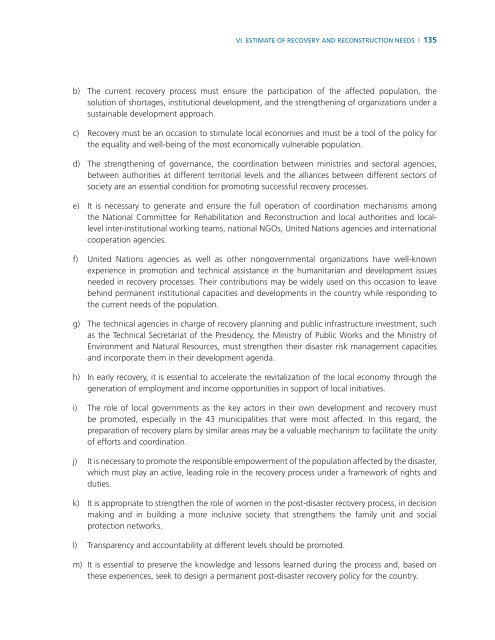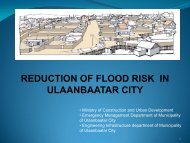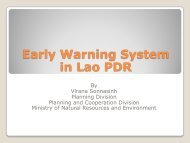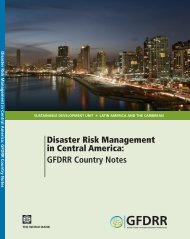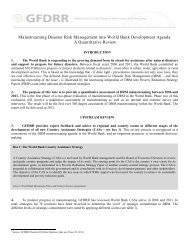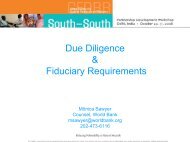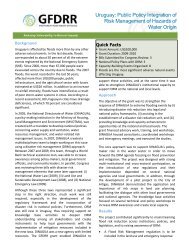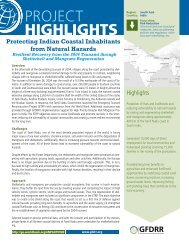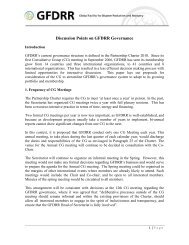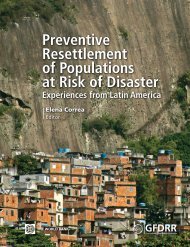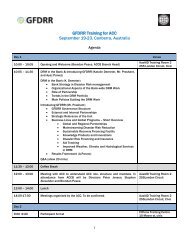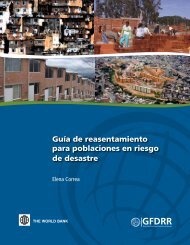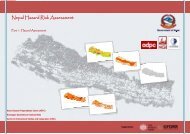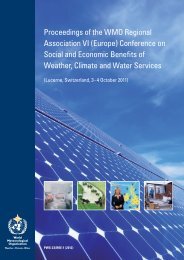El Salvador - GFDRR
El Salvador - GFDRR
El Salvador - GFDRR
Create successful ePaper yourself
Turn your PDF publications into a flip-book with our unique Google optimized e-Paper software.
VI. ESTIMATE OF RECOVERY AND RECONSTRUCTION NEEDS | 135<br />
b)<br />
c)<br />
d)<br />
e)<br />
f)<br />
g)<br />
h)<br />
i)<br />
j)<br />
k)<br />
l)<br />
m)<br />
The current recovery process must ensure the participation of the affected population, the<br />
solution of shortages, institutional development, and the strengthening of organizations under a<br />
sustainable development approach.<br />
Recovery must be an occasion to stimulate local economies and must be a tool of the policy for<br />
the equality and well-being of the most economically vulnerable population.<br />
The strengthening of governance, the coordination between ministries and sectoral agencies,<br />
between authorities at different territorial levels and the alliances between different sectors of<br />
society are an essential condition for promoting successful recovery processes.<br />
It is necessary to generate and ensure the full operation of coordination mechanisms among<br />
the National Committee for Rehabilitation and Reconstruction and local authorities and locallevel<br />
inter-institutional working teams, national NGOs, United Nations agencies and international<br />
cooperation agencies.<br />
United Nations agencies as well as other nongovernmental organizations have well-known<br />
experience in promotion and technical assistance in the humanitarian and development issues<br />
needed in recovery processes. Their contributions may be widely used on this occasion to leave<br />
behind permanent institutional capacities and developments in the country while responding to<br />
the current needs of the population.<br />
The technical agencies in charge of recovery planning and public infrastructure investment, such<br />
as the Technical Secretariat of the Presidency, the Ministry of Public Works and the Ministry of<br />
Environment and Natural Resources, must strengthen their disaster risk management capacities<br />
and incorporate them in their development agenda.<br />
In early recovery, it is essential to accelerate the revitalization of the local economy through the<br />
generation of employment and income opportunities in support of local initiatives.<br />
The role of local governments as the key actors in their own development and recovery must<br />
be promoted, especially in the 43 municipalities that were most affected. In this regard, the<br />
preparation of recovery plans by similar areas may be a valuable mechanism to facilitate the unity<br />
of efforts and coordination.<br />
It is necessary to promote the responsible empowerment of the population affected by the disaster,<br />
which must play an active, leading role in the recovery process under a framework of rights and<br />
duties.<br />
It is appropriate to strengthen the role of women in the post-disaster recovery process, in decision<br />
making and in building a more inclusive society that strengthens the family unit and social<br />
protection networks.<br />
Transparency and accountability at different levels should be promoted.<br />
It is essential to preserve the knowledge and lessons learned during the process and, based on<br />
these experiences, seek to design a permanent post-disaster recovery policy for the country.


